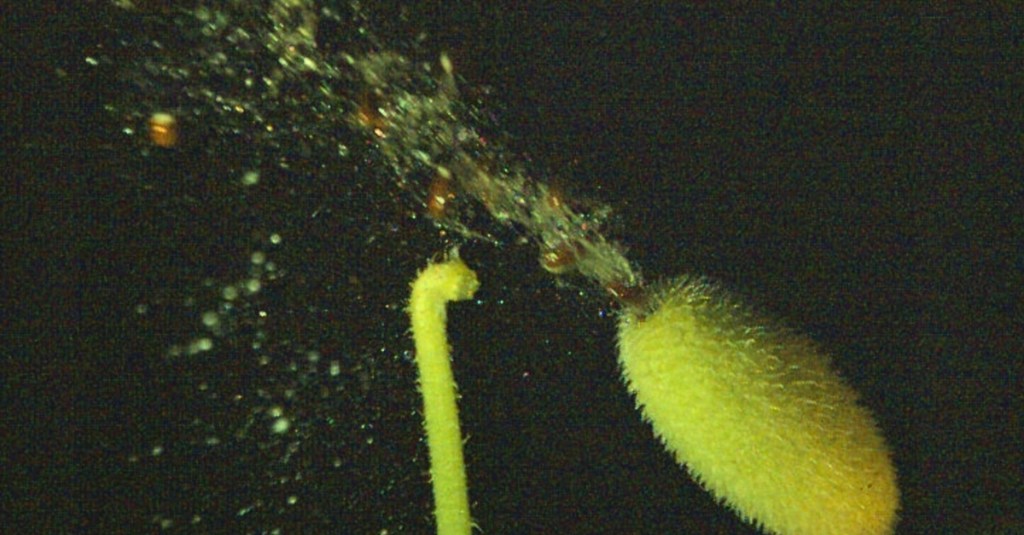Boy, oh, boy. Weed sure has gotten complicated these last years.
Everybody has to dust off their high school chemistry book to know what the hell they’re buying. And so you’ve stumbled upon this guide because you ran across some influencer hyping up THCa.
Videos by VICE
But what even is THCa? And how does it differ from regular THC? If you’ve been asking the (Google) gods these questions and are still seeking answers, you’ve come to the right place. I’ve put together this explainer to, well, explain all this and more.
For the purposes of this conversation, “THC” refers to Delta-9 THC. Delta-8 THC isn’t part of this discussion; that’s a whole other thing.
What Is THCA?
THCa (tetrahydrocannabinolic acid) is a chemical found in the cannabis plant and a precursor to THC (tetrahydrocannabinol), like THC before puberty. On its own, THCa isn’t psychoactive. But heating THCa turns it into THC, which will get you high.
A certain amount of THCa is naturally turned into THC, from things like sunlight. But all it takes to turn the rest of the THCa into THC is heat, whether from cooking, vaping, or sparking up. That’s why eating a fistful of cannabis flower (ew, don’t do that) won’t get you high the same way edibles or smoking will.
THCa vs. THC: Why is THCa Legal?

The Farm Bill in 2018 removed hemp from the federal list of controlled substances. Hemp is any cannabis plant that contains 0.3 percent THC (we’re still talking about Delta-9) or less by dry weight. But the legal definition says nothing about THCa content.
Marijuana — any cannabis plant with more than 0.3 percent THC — is a federally controlled substance, and its legality depends heavily on whichever state you happen to be in. So the legal loophole here is that cannabis with high levels of THCa and low enough levels of THC is federally legal, even though heating the cannabis will turn allllll that THCa into classic THC.
Lack of Regulation, So Be Careful
Non-regulation has a drawback, though. Knowing the exact potency of what you’re buying is tricky. Some THCa products don’t explain the full THC potential of a product. People are cultivating hemp with high levels of THCa. Once heated, the existing THC combines with the THCa, creating a stronger high than one might expect.
“Many hemp businesses are selling THCa hemp flower that is not labeled with total THC. These products often have a total THC concentration of 15 percent to 20 percent when smoked or vaped,” the CDC continues. So what starts with less than 0.3 percent THC quickly jumps as high as 20 percent with some fire. The regulations on labeling haven’t caught up with the new cannabis products yet.
We’re in a bit of a Wild West moment with THCa right now, as the old barriers of it being outlawed haven’t yet been replaced by the fences of regulation. Be cautious when consuming what is sold as a THCa product, as it could be just as strong as recreational marijuana if heated.
so, what’s thca good for?
As mentioned, THCa is an innocent compound that the government doesn’t have any rules about. But when you wake it up with heat, it becomes outlaw THC. It’s a brilliant way for people in non-legal states to get cannabis that’s rich with THC.
Some medical claims are that it offers anti-inflammatory and anti-nausea benefits, as well as stimulating appetite. Lots of these studies have been done on animals (not cool!), so take early medical reports with a grain of salt.
Others use THCa to wean themselves off marijuana after they’ve developed a dependency, without getting high. Chemically, cannabis doesn’t have any inherently addictive compounds, such as nicotine or heroin. However, it can be habitually addictive, just like alcohol.
Basically, it’s psychologically addictive, not physiologically. This type of addiction is still very real and can lead to destructive behavior and unpleasant withdrawal symptoms. But unlike substances like opioids and nicotine, the body will not have an immediate addictive response to consuming it. It’s all about moderation and knowing thyself!
Dipping Your Toe Into THCa
To be safe, we recommend treating any THCa product like a THC product, especially if you plan to smoke, vape, or cook with it. If you’re looking for the soothing effects many people talk about, CBD is usually a safer alternative, as there’s more research on it, and it can’t be as easily turned into psychoactive THC.
THCa Products to Explore
If you’re looking for THCa products, here are our top recommendations:
If you can’t legally buy marijuana in your state, Diamond CBD Legal Cannabis Indoor Flower is a clever workaround. This is technically hemp, but once you heat it up, the THCa will become Delta-9 THC and deliver a typical high.
Diamond CBD Fresh Extreme Delta-8 and THCa Gummies take advantage of two legal loopholes, giving you THCa and Delta-8 THC, both of which fall into legal grey areas. The raw THCa won’t get you high, but the Delta-8 THC will. But it’s a milder high for most people than Delta-9 THC.
Cheef Botanicals Watermelon OG THCa Gummies contain raw THCa, so unless you melt them into a gooey mess, they aren’t psychoactive; they’re just for wellness purposes.
Watermelon OG THCa Gummies (opens in a new window)
More
From VICE
-

BSIP/Contributor/Getty Images -

Eric O'Connell/Getty Images -

Perplexity Comet – Credit: Perplexity -




